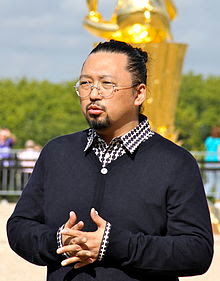Takashi Murakami is a prolific contemporary Japanese artist who works in both fine arts media—such as painting—as well as digital and commercial media. He blurs the boundaries between high and low art.
He appropriates popular themes from mass media and pop culture, then turns them into thirty-foot sculptures, "Superflat" paintings, or marketable commercial goods such as figurines or phone caddies.
Takashi Murakami attended the Tokyo National University of Fine Arts and Music, initially studying more traditional Japanese art. He pursued a doctorate in Nihonga, a traditional style of Japanese painting.
However, due to the popularity of anime and manga (Japanese styles of animation and comic graphic stories), Murakami became disillusioned with Nihonga. He became passionate about otaku culture, which he felt was more representative of modern-day Japanese life.
This resulted in Superflat, the style that Murakami is credited with inventing. It developed from Poku, (Pop + otaku). Murakami has written that he aims to represent Poku culture because he expects that animation and otaku might create a new culture.
This new culture is a rejuvenation of the contemporary Japanese art scene. In interviews, Murakami has expressed a frustration with the lack of a reliable and sustainable art market in post-war Japan, and the general view of Japanese art as having a low art status.
He is quoted as saying that the market is nothing but "a shallow appropriation of Western trends". His first reaction was to make art in non-fine arts media. Then he decided to focus on the market sustainability of art and promote himself first overseas. This marks the birth of KaiKai Kiki, LLC.
In 2008, Takashi Murakami made Time magazine's "100 Most Influential People" list, the only visual artist included.

